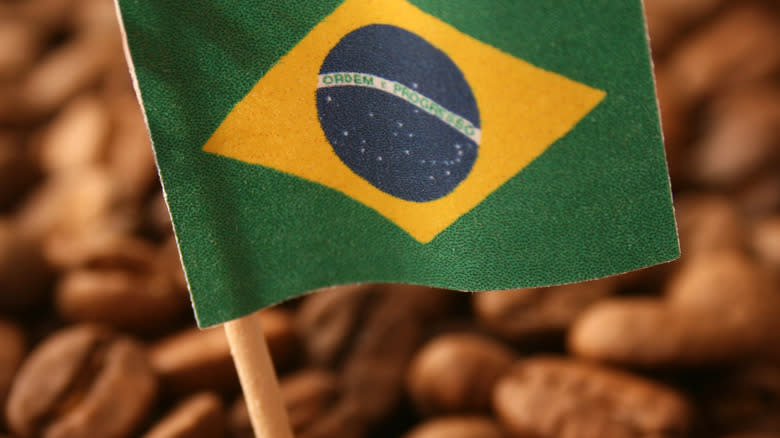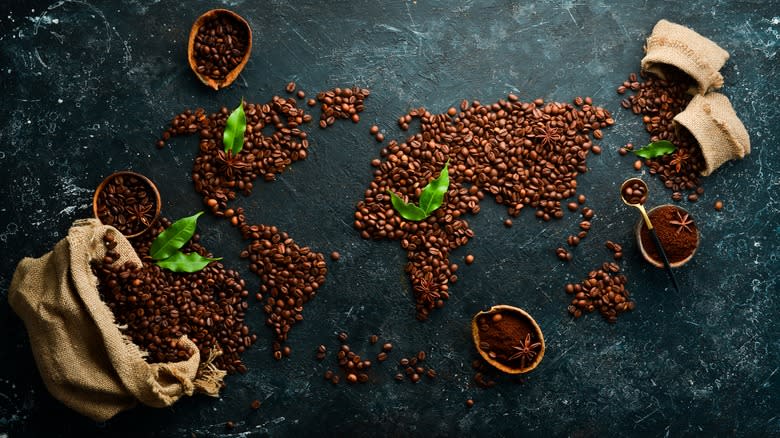

Brazil has earned a well-deserved reputation as the coffee capital of the world. And for good reason. With the largest production and exportation of coffee globally, Brazil has solidified its position as the leading player in this industry. The country’s advantageous climate and strategic geographical location contribute to its ability to cultivate and grow coffee on an unprecedented scale. Moreover, coffee farming is not only a significant agricultural endeavor but also a major player in Brazil’s thriving economy.
▶ [Kucoin] Transaction fee 0% discount CODE◀
Brazil’s Coffee Production
Brazil is renowned as the leading producer of coffee in the world. Its coffee industry plays a crucial role on the global stage, as Brazil consistently produces the largest amount of coffee and exports it to numerous countries. The growth and success of Brazil’s coffee industry can be attributed to its ideal climate and geographical location, the history of coffee cultivation in the country, the varieties of coffee grown, farming techniques employed, the role of technology, prominent coffee-growing regions, coffee export and trade, the significance of coffee in Brazilian culture, and the challenges and future prospects of the Brazilian coffee industry.
Ideal Climate and Geographical Location
The tropical climate of Brazil provides the perfect conditions for coffee cultivation. The country’s warm temperatures, ample sunshine, and moderate rainfall throughout the year ensure the optimal growth of coffee plants. Additionally, Brazil’s vast geographical area allows for various microclimates, enabling coffee to be grown in different regions with varying altitudes and soil conditions. The ideal altitude and soil composition further contribute to the exceptional quality and unique flavors found in Brazilian coffee. Moreover, the distinct rainfall patterns in different coffee-growing regions of Brazil aid in the development of coffee crops, ensuring a consistent yield year after year.
History of Coffee in Brazil
The introduction of coffee to Brazil is rooted in its colonial history. In the early 18th century, coffee was brought to Brazil by Francisco de Melo Palheta, a Portuguese army officer. Initially, coffee cultivation was limited to small-scale production in the northern region of the country. However, the demand for coffee grew rapidly, leading to the establishment of large coffee plantations. This marked the rise of coffee as a major agricultural commodity in Brazil. The coffee boom in the late 19th and early 20th centuries brought significant economic prosperity to the country, propelling it to become a dominant force in the global coffee trade.
Varieties of Coffee Grown in Brazil
Brazil cultivates primarily two varieties of coffee: Arabica beans and Robusta beans. Arabica beans, known for their superior quality and milder flavor, constitute the majority of coffee produced in Brazil. They are typically grown in higher-altitude regions, resulting in a more nuanced taste profile. On the other hand, Robusta beans, characterized by their robust and slightly bitter taste, are cultivated in lower-altitude regions. These beans are often used in blends to enhance the body and crema of the coffee. Alongside these primary varieties, Brazil is also known for its production of unique blends and flavors, catering to the diverse preferences of coffee enthusiasts worldwide.
Coffee Farming Techniques
Coffee farming in Brazil involves a combination of traditional and modern techniques. Planting and cultivation methods have evolved over time to optimize the growth and yield of coffee plants. Farmers employ meticulous care in selecting the right location, preparing the soil, and planting seeds or seedlings. Regular pruning, fertilization, and pest control measures are undertaken to ensure healthy plant growth. Harvesting is typically done manually, with skilled workers selectively picking ripe coffee cherries. The processing stage involves either the dry or wet method, depending on the desired flavor profile. Lastly, quality control measures are in place to maintain the high standards expected from Brazilian coffee.
Role of Technology in Coffee Production
Technology has played a significant role in improving the efficiency and productivity of Brazil’s coffee industry. Mechanization and automation have streamlined various aspects of coffee production, reducing labor requirements and increasing overall output. Machinery is now employed for tasks such as planting, pruning, and harvesting, allowing for faster and more precise operations. Advancements in processing techniques have also been instrumental in maintaining the quality and consistency of Brazilian coffee. Through advanced drying and milling methods, the flavor nuances and unique characteristics of each coffee batch can be preserved. These advancements have not only boosted productivity but have also ensured that Brazilian coffee remains highly regarded in the global market.
Prominent Coffee Growing Regions in Brazil
São Paulo, Minas Gerais, and Espírito Santo are among the most prominent coffee-growing regions in Brazil. São Paulo, located in the southeastern part of the country, boasts diverse microclimates that yield a wide range of coffee flavors. This region produces both Arabica and Robusta beans, with its coffee being known for its balanced acidity and nutty undertones. Minas Gerais, situated in the southeastern and central-western regions of Brazil, is the largest coffee-producing state in the country. It is renowned for its high-quality Arabica coffee, with a distinct sweetness and rich aroma. Espírito Santo, located in the southeastern region, is known for its significant Robusta coffee production, characterized by its full-bodied flavor and earthy notes.
Coffee Export and Trade
Brazil’s status as a major exporter of coffee beans is widely acknowledged. The country consistently leads in coffee export volume, supplying coffee to markets across the globe. Brazilian coffee has a dominant presence in the international market, with a reputation for quality and consistency. The global reach of Brazilian coffee is attributed to its favorable pricing and the strong trading relationships established over the years. Brazil’s coffee export sector operates under specific policies and regulations to ensure fair trade practices and maintain the reputation of its coffee industry.
Review of Brazil’s Coffee Culture
Coffee holds significant cultural importance in Brazil, deeply ingrained in the daily lives of its people. Brazilians embrace coffee as a social ritual, fostering connections and friendships. Cafés and coffeehouses are an integral part of Brazilian culture, serving as meeting places and epicenters of social activity. Along with the traditional brewing methods, such as the popular “cafezinho,” Brazilian coffee culture has embraced modern trends, including specialty coffee shops and artisanal brewing techniques. Coffee consumption is widespread, with Brazilian households consuming large quantities of coffee annually. This cultural affinity for coffee further amplifies Brazil’s position as a leading coffee-producing nation.
Challenges and Future of Brazilian Coffee Industry
The Brazilian coffee industry faces several challenges that call for attention and proactive measures. Climate change poses a significant threat, as shifts in weather patterns and rising temperatures impact coffee production. Sustainable practices and innovative solutions are crucial to mitigating these challenges and adapting to the evolving climate conditions. Furthermore, competition from other coffee-producing countries has increased over the years, necessitating continuous efforts to maintain Brazil’s market dominance. To ensure sustained growth, investments in research and development are essential, enabling the exploration of new coffee varieties, farming techniques, and processing methods. The future of the Brazilian coffee industry lies in the ability to address these challenges and seize opportunities for innovation and collaboration.
In conclusion, Brazil’s coffee production is a testament to its ideal climate, geographical advantages, rich history, and diverse coffee culture. The quality and quantity of coffee cultivated in Brazil have propelled the country to be the leading producer and exporter on a global scale. With its continuous growth, utilization of technology, and commitment to excellence, Brazil’s coffee industry remains a powerhouse and a vital contributor to the nation’s economy. As the challenges of climate change and global competition persist, the Brazilian coffee industry must adapt and invest in sustainable practices and research to secure its future as the world’s coffee capital.
RELATED POSTS
View all





